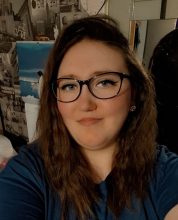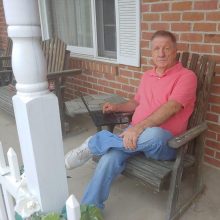The Cut by C. J. Dotson
What led you into writing?
I’ve always been super preoccupied with stories—I learned to read when I was four and became obsessed with books, when I was little I’d tell smaller kids scary stories on the bus to and from school, and when I was nine years old one of my teachers, Mrs. Frank, had our class write stories to submit to a local community college’s annual “Young Authors Competition.” That’s when I completely fell in love with writing, and it’s the only thing I’ve wanted to do ever since.
How does a typical day look?
That depends on the time of year! My day job is with the local school district, and right now I’m in the middle of summer vacation. So during breaks, I get up at 4:15 every morning, make myself a cup of coffee, and head to my writing room. I give myself about half an hour to let my brain wake all the way up, and then I write until my kids wake up and need breakfast—usually between 7:30 and 9:30. I almost never eat at the table, I take nearly all of my meals curled up on the couch with a book. After breakfast I catch up on a couple of the daily chores, then if the kids are settled and things are chill I go back to the writing room. Even when they are settled, once the kids are awake there’s the constant potential for interruptions (the dog and six cats don’t help with that, either), so deep focus isn’t always possible during this part of the day, which means I spend the next couple hours alternating between writing and trying (with little success) to keep up with social media, and I also spend this time talking with my writing friends, researching, brainstorming, lower-effort things like that. Break for lunch (on the couch with a book) and then either more chores, more time with the kids, errands, or more time in my writing room. Dinner is either on the couch with a book, or on the couch watching a show with my son (right now we’re watching Buffy the Vampire Slayer, his first time seeing it). My evenings are pretty relaxed. Before my daughter’s bedtime we watch an episode of Phineas and Ferb, and once she’s in bed my husband and I either play video games together or watch something together.
During the school year, my morning writing time ends at 6 when I get up to get the kids and myself ready for school and work. My daily shift is shorter than the kids’ school day, so I get a little extra uninterrupted time to write before and after, but I’m also more likely to run more frequent errands after work since I’m out of the house anyway. The earliest part of my mornings and the evenings are the same as during the breaks, though.
In what ways do your characters test your abilities?
I have an idea for a horror novel that I really, really love the concept of, but I’ve been holding myself back from writing it in part because the main character for that project would be a mycology student and I am not confident in my ability to write somebody smarter than me, somebody science-minded. Any time I set out to write a character who is smarter than I am, or more capable, or who has specific skills that I don’t have, it’s a challenge. I think most writers—most artists of any kind—are constantly striving to improve, to stretch further and to reach higher; I don’t think there’s a finish-line for most creative people when it comes to honing our ability to create, and with every new experience I have, however unrelated to writing itself, I find myself improving my craft. Research and imagination can take you so, so far, but at a certain point I always find myself wishing I had the time and resources to pursue more firsthand experiences, and that’s the way I find character writing the most challenging. I have to push past this idea I have that I can’t REALLY write this character or that character until I’ve found a way to gain some experience in whatever their thing is.
What’s your setup?
I have a writing room that I hesitate to call an office, because it still looks more like the bedroom it used to be than the workspace it is now. I don’t have a desk, I write in a recliner with my laptop. The room still has a bed in it, which I like for journaling and for somewhere comfortable to be when I am in a “just sit and think through something” phase in the writing process. I don’t have any bookshelves in here yet, but I do have a dresser from when this was a bedroom and the top has a few knicknacks as well as my TBR stack and my past-favorites stack, and the drawers are slowly filling with books I’ve read already. This is the first time I’ve had a dedicated room just for my writing and it’s made such a dramatic improvement in my ability to focus, it’s cozy and I have little writerly odds and ends and art from my kids and from friends, I love it.
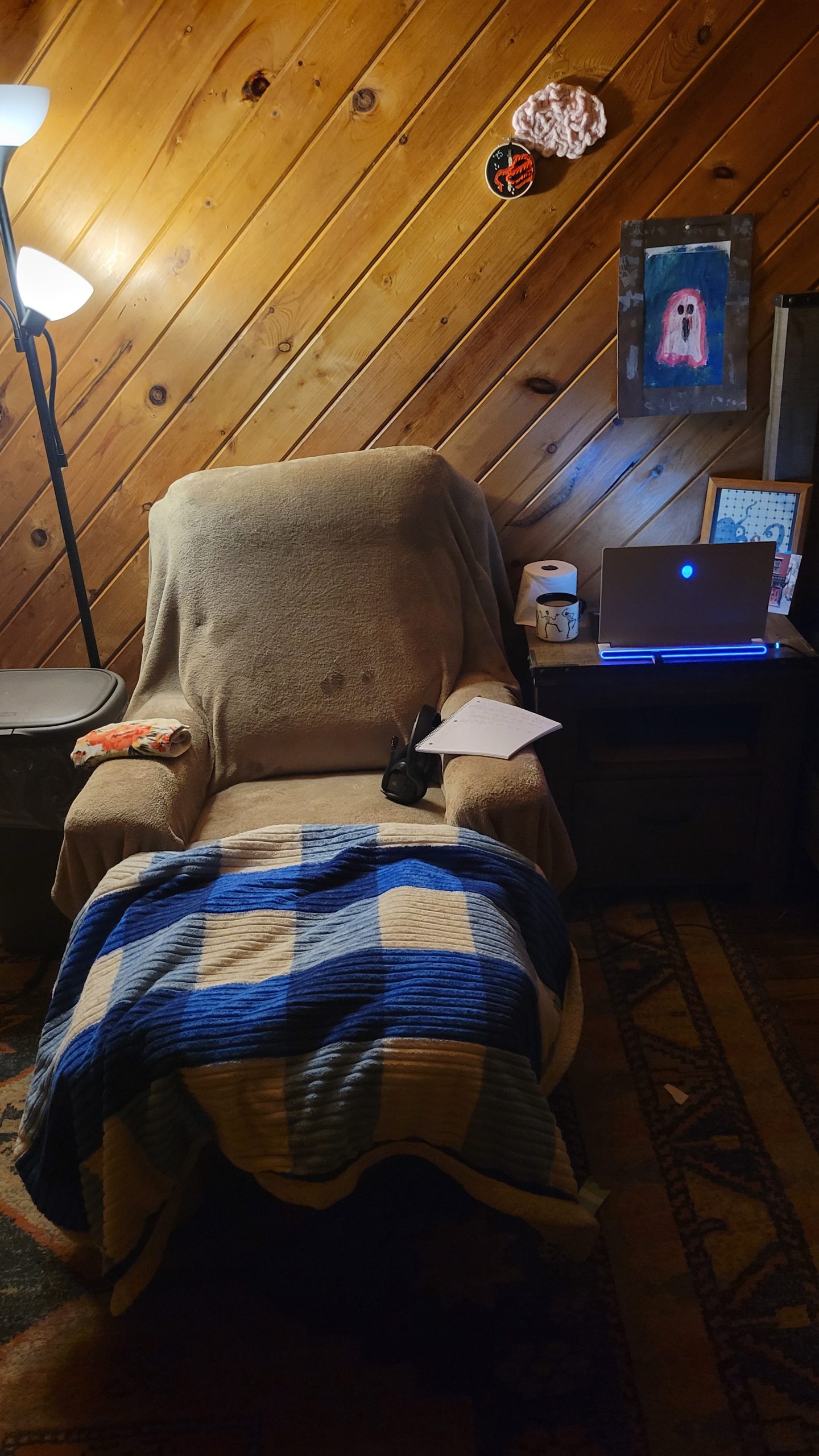
What lasting effects have your favourite authors had on your writing and style?
This is such a good question but such a hard question, because I don’t think I can narrow down my favorite authors into any kind of easily assessable group—there are just too many books I love by too many authors whose skill and artistry I admire deeply. I find inspiration in almost everything I read; even books I don’t love have something worth examining and aiming with a critical eye at my own work, though of course the books that really impact me are the ones that I find the most inspiration in. Most recently I’d say the character writing of R.A. Black, Eric LaRocca’s juxtaposition of the absolutely gruesome with the loveliest prose, the pacing and unabashed grossness in both Nat Cassidy’s When the Wolf Comes Home and Clay McLeod Chapman’s Wake Up and Open Your Eyes, the incredible portrayal of women and women’s relationships in everything Rachel Harrison writes, the descriptive language in Hester Steel’s The Faceless Thing We Adore, the masterful use of mood and tone that saturates everything by MK Hardy, the perfect grasp of voice that CM Waggoner has. You read anything by these authors and you just want to learn from their work and take what you learn into your own writing, they’re all fantastic.
What do you do for inspiration?
This question used to be a difficult one for me because I don’t really go out seeking inspiration. I love stories, I love books and television and movies and video games (I think that some of the best storytelling of recent years has been found in incredible games like Alan Wake 2 and Clair Obscur: Expedition 33). You consume enough of the type of storytelling that speaks to you, the type that you love, and it becomes easier and easier to find that type of storytelling within yourself. I’m particularly drawn to speculative storytelling and the surreal. And the more art like this that I internalize the more it filters the way I look at the world, and then you start to see inspiration all over the place. This could go back to something I was mentioning earlier, that one of the ways I feel limited sometimes is in my inability to seek out as many experiences as I wish I had the time and resources for—the inspiration that I find in my day-to-day, extremely routine life keeps me busy with enough ideas that I have to keep files in my laptop for jotting new ones down so they can wait their turn…so what more might I be able to come up with if I could experience more new things? Right now I guess the short answer is that I consume as much art as I can and then go about my life, but the ideal answer would be that I’d love to consume as much art as I can and then have adventures and see where that could take my writing.
What repeating themes do you find yourself pulling into your stories?
Family, particularly motherhood, is a huge theme for me; I’m sure I have written a few stories in which a familial relationship is not in some way vital, but I can’t think of one off the top of my head right now. I also find myself frequently coming back to stories in which the protagonist returns to her childhood in some way, whether that’s a place that was important to her in her childhood, or a person or activity, or some other part of her youth, so in that way I suppose I’d say that growing up or having grown up often hangs over my writing. Isolation comes up in my work often as well, in different forms—sometimes this goes back to motherhood and how lonely new motherhood can feel even in the best of circumstances, sometimes it’s societal either as a closer look at outcasts or more broadly like during the pandemic, sometimes it’s something big and apocalyptic and so part of the plot itself, sometimes it’s psychological and a very personal kind of isolation, sometimes it’s very literal and environmental.
How do you wind down?
My all time favorite way to relax is with a book and food. This has been my mental reset button ever since I was a little kid reading fantasy, and in fantasy books there’s so often at least one description of a meal, and then on top of that I would get so into the book that I would feel like I’d been the one on an adventure and working up an appetite. So I’d eat and read. The habit continued in school where I brought a book with me to the lunchroom every day, and now it’s completely ingrained. I find it the most comfortable way to relax and forget about problems and just be.
What sort of challenges do you regularly overcome while designing your world/setting?
About five years ago I switched from primarily writing SFF to primarily writing contemporary horror, and the biggest change from that is how little there is to designing the world. Worldbuilding is a place where I really struggled not to give in to my temptation to overwrite, which makes it maybe counterintuitive that the challenge I really had to overcome with my settings in contemporary horror was failing to describe them well enough. Earlier I mentioned taking some inspiration from the writing style of Hester Steel; I was incredibly lucky to read an early draft of her debut, The Faceless Thing We Adore, and her descriptive writing was so lush and immersive and captivating, it immediately made me see how I’d been neglecting that in my own writing before. Remembering to include descriptions of the setting is still not quite second nature, but I do remember it every time now (even if it comes in during later drafts), and now I just have to make sure I don’t start accidentally applying my overwriting tendencies to that, too.
What are you reading at the moment?
I’m about halfway through A Cold Night for Alligators by Viggy Parr Hampton and I’m enjoying it a lot so far. I started it with the idea to possibly use it as a comp title for a future project but I’m totally digging it on its own merit now. I haven’t finished it yet so I’ll save my thoughts on it until I have and for now I’ll share the description from GoodReads: “A determined CDC epidemiologist goes rogue to tackle a mysterious outbreak in Savannah, only to find himself entangled with a pair of urban explorers and a dangerous, tortured soul in an abandoned theme park where dark forces stir.”
What’s the most useful advice you could give to an aspiring author?
Find your community, find your people in the writing world. These friends will be the ones who really understand the highs and the lows, who will celebrate your wins with you knowing how hard you worked to get them, who will commiserate the tough times with empathy born of understanding, and who you can celebrate with and comfort in turn. The camaraderie is lovely. It’s also really helpful to have writing friends who can swap beta reading with you. First, these people will know you and your work and what you’re going for in a way a paid beta reader or a stranger won’t be able to. And second, it’s so helpful to beta read other people’s work because as you help them strengthen their stories the way they’ve helped you strengthen yours, you’ll be deepening your understanding of the craft. Plus it’s fun. Writing is often a super solitary activity, having a writing community adds more fun to the whole thing. And, you know, friendship in general is its own absolutely vital benefit.
Tell us about the book you’re promoting.
The Cut follows Sadie Miles, who has just found out that she is pregnant with her abusive fiancé’s baby, and this discovery forces her to acknowledge that she cannot spend her life with this man. So when he goes to work she packs a bag for herself and for her daughter by her late husband, and flees. They wind up at the historic but past-its-prime L’Arpin Hotel, where Sadie gets a job as a housekeeper and a temporary free room for herself and her daughter. On her first night, just when she thinks her luck has turned around, Sadie glances out her window to see a guest struggling in the hotel pool. She runs to help, but by the time she gets there the water is calm and empty, and her manager insists no one has even been through the lobby all night. After her ex, Sadie will never again let anyone tell her that what she’s experiencing isn’t real, and in such a precarious point in their lives she can take no chances, so Sadie snoops around herself and soon discovers that the dilapidated hotel is not as placid as it first seems. With no options and no backup plan available, Sadie must discover what goes bump in the night—and drip in the walls, squirm in the tub, and slither in the halls—in order to keep herself, her toddler, and her unborn baby safe.
Thank you so much for having me!
👋 Hi! I run Author Interviews
As a new writer I found myself itching to contribute to a thriving, creative community, so I made Author Interviews and I've met loads of wonderful people in the process. You can buy my debut fantasy RINGLANDER: THE PATH AND THE WAY from Amazon.
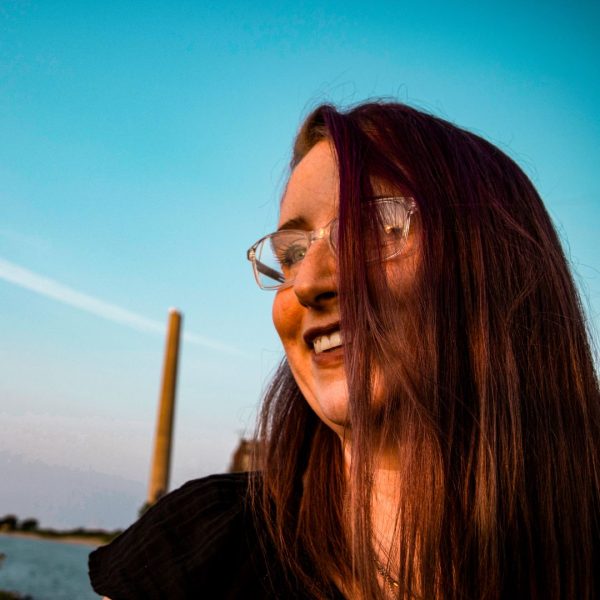
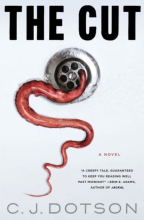
 Audible
Audible
